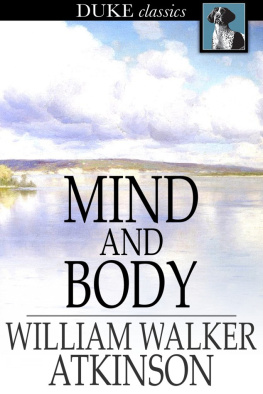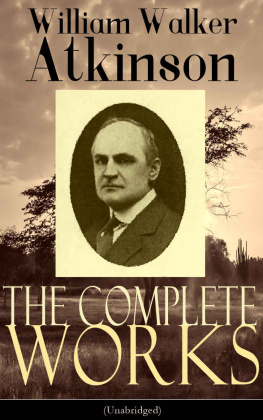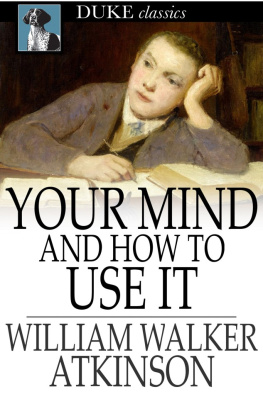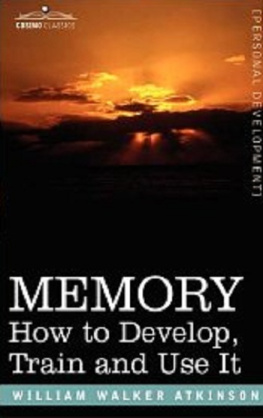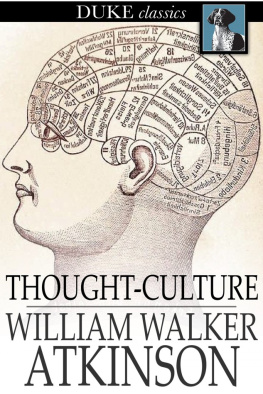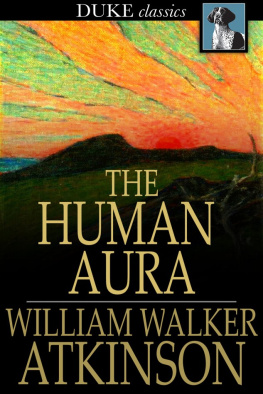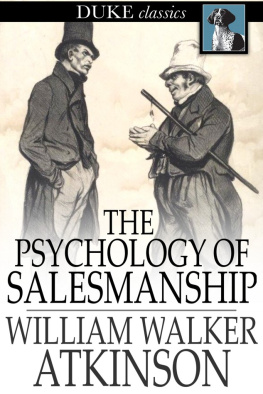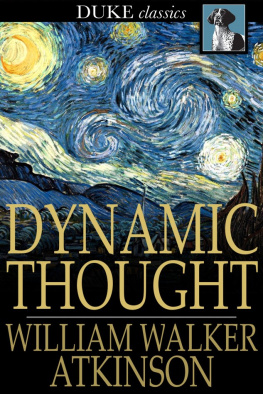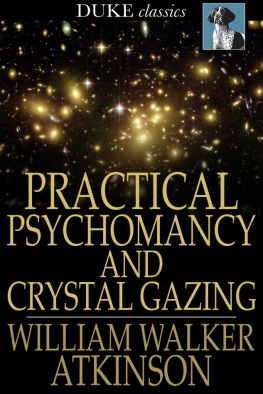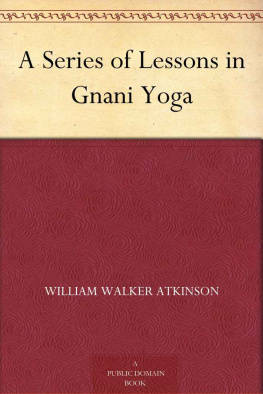MIND AND BODY
OR, MENTAL STATES AND PHYSICAL CONDITIONS
* * *
WILLIAM WALKER ATKINSON
*
Mind and Body
Or, Mental States and Physical Conditions
First published in 1910
ISBN 978-1-63421-257-1
Duke Classics
2014 Duke Classics and its licensors. All rights reserved.
While every effort has been used to ensure the accuracy and reliability of the information contained in this edition, Duke Classics does not assume liability or responsibility for any errors or omissions in this book. Duke Classics does not accept responsibility for loss suffered as a result of reliance upon the accuracy or currency of information contained in this book.
Contents
*
Foreword
*
Mind and BodyMental States and Physical Conditions! To the mindof those who have contented themselves with merely the superficialaspects of things, these two thingsmind and body; and mental statesand physical conditionsseem to be as far apart as the two poles; seemto be opposites and contradictories impossible of reconciliation.But to those who have penetrated beneath the surface of things,these two apparent opposites are seen to be so closely related andinter-relatedso blended and mingled together in manifestationthat itis practically impossible to scientifically determine where the oneleaves off and the other begins. And so constant and close is theirmutual action and reaction, that it often becomes impossible to statepositively which is the cause and which the effect.
In the first place, Science now informs us that in all livingsubstance, from cell to mammoth, there is and must be Mind. Therecan be no Life without Mind. Mind, indeed, is held to be the very"livingness" of Lifethe greater the degree of manifestation of Mind,the higher the degree of Life. Moreover, the New Psychology informsus that upon the activities of the Subconscious Mind depend all theprocesses of physical lifethat the Subconscious Mind is the essenceof what was formerly called the Vital Forceand is embodied in everycell, cell-group or organ of the body. And, that this Subconscious Mindis amenable to suggestion, good and evil, from the conscious mind ofits owner, as well as from outside. When the subject of the influenceof Mental States upon Physical Conditions is studied, one sees thatthe Physical Condition is merely the reflection of the Mental State,and the problem seems to be solved, the mystery of Health and Diseasesolved. But in this, as in everything else, there is seen to be anopposing phasethe other side of the shield. Let us look at the otherside of the question:
Just as we find that wherever there is living substance there is Mind,so do we find that we are unable to intelligently consider Mind unlessas embodied in living substance. The idea of Mind, independent ofits substantial embodiment, becomes a mere abstraction impossibleof mental imagingsomething like color independent of the coloredsubstance, or light without the illuminated substance. And just as wefind that Mental States influence Physical Conditions, so do we findthat Physical Conditions influence Mental States. And, so the problemof Life, Health and Disease once more loses its simplicity, and themystery again deepens. The deeper we dig into the subject, the more dowe become impressed with the idea of the universal principle of Actionand Reaction so apparent in all phenomena. The Mind acts upon the Body;the Body reacts upon the Mind; cause and effect become confused; thereasoning becomes circularlike a ring it has no beginning, no end; itsbeginning may be any place we may prefer, its ending likewise.
The only reconciliation is to be found in the fundamental workinghypothesis which holds that both Mind and Bodyboth Mental States andPhysical Conditionsare the two aspects of something greater thaneitherthe opposing poles of the same Reality. The radical Materialistasserts that the Body is the only reality, and that Mind is merelyits "by-product." The Mentalist asserts that the Mind is the onlyreality, and that the Body is merely its grosser form of manifestation.The unprejudiced philosopher is apt to stand aside and say: "You areboth right, yet both wrongeach is stating the truth, but only thehalf-truth." With the working hypothesis that Mind and Body are butvarying aspects of the Truththat Mind is the inner essence of theBody, and Body the outward manifestation of the Mindwe find ourselveson safe ground.
We mention this fundamental principle here, for in the body of thisbook we shall not invade the province of metaphysics or philosophy,but shall hold ourselves firmly to our own field, that of psychology.Of course, the very nature of the subject renders it necessary thatwe consider the influence of psychology upon physiology, but we haveremembered that this book belongs to the general subject of the NewPsychology, and we have accordingly emphasized the psychological sideof the subject. But the same material could have been used by a writerupon physiology, by changing the emphasis from the psychological phaseto the physiological.
We have written this book to reach not only those who refuse tosee the wonderful influence of the Mental States over the PhysicalConditions, but also for our "metaphysical" friends who have becomeso enamored with the power of the Mind that they practically ignorethe existence of the Body, indeed, in some cases, actually denying theexistence of the latter. We believe that there is a sane middle-groundin "metaphysical healing," as there is in the material treatmentof disease. In this case, not only does Truth lie between the twoextremes, but it is composed of the blending and assimilation of thetwo opposing ideas and theories. But, even if the reader does not fullyagree with us in our general theories and conclusions, he will findwithin the covers of this book a mass of facts which he may use inbuilding up a new theory of his own. And, after all, what are theoriesbut the threads upon which are strung the beads of factsif ourstring does not meet with your approval, break it and string the beadsof fact upon a thread of your own. Theories come, and theories gobutfacts remain.
Chapter I - The Subconscious Mind
*
In order to understand the nature of the influence of the mind uponthe bodythe effect of mental states upon physical functionswe mustknow something of that wonderful field of mental activity which in theNew Psychology is known as "The Subconscious Mind," and which by somewriters has been styled the "Subjective Mind;" the "Involuntary Mind;"the "Subliminal Mind;" the "Unconscious Mind," etc., the difference innames arising because of the comparative newness of the investigationand classification.
Among the various functions of the Subconscious Mind, one of themost important is that of the charge and control of the involuntaryactivities and functions of the human body through the agency of thesympathetic nervous system, the cells, and cell-groups. As all studentsof physiology know, the greater part of the activities of the bodyare involuntarythat is, are independent (or partly so) of the controlof the conscious will. As Dr. Schofield says: "The unconscious mind,in addition to the three qualities which it shares in common with theconsciousviz., will, intellect and emotionhas undoubtedly anothervery important onenutrition, or the general maintenance of the body."And as Hudson states: "The subjective mind has absolute control of thefunctions, conditions and sensations of the body." Notwithstanding thedispute which is still raging concerning

